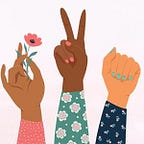Being a (white) Foreigner
I’m 29 years old and I’ve been a foreigner for most of my adult life: from that day when I was 20 and hopped on a plane to the US, excited and eager to experience new adventures, through all the years, flights and countries in between that led me to building a life in Uganda for the past three years.
Being a foreigner is a status. Depending on your race, religion, sexual orientation, or gender, it can give you a higher or a lower one in the social ladder of any country. Being white, or at least perceived as white in most countries I’ve been to (‘cause to be honest I don’t even know how to define whiteness), being a foreigner often gave me a higher social status. In most instances, the least it did is it made me interesting by default.
And I’ve often wondered if this thing, the “being interesting by default”, is an addiction. I was talking to my best friend, an Italian who has been living in the States for the past seven years, about the possibility of accepting a job in Italy and moving back “home”. And I remember her saying that she didn’t know how “not being a foreigner” would affect her, having been used to that automatic curiosity from people merely because of your “difference”.
We all want to be seen, we all want people to show attention to us. And as a foreign, white person, that attention is almost always positive and benign. Sadly, the story is too often reversed if you’re black, or Muslim, or queer (or anything that deviates from the image of the “straight white Catholic man”). But as a straight white woman living in Uganda, I cannot deny the privileges that are bestowed upon me every day just because of that.
The issue is, who says no to privilege when it’s handed over to them on a silver plate? You need to have great morality, sense of justice, vision and awareness to do that. Sometimes you fail nonetheless. You can try. You can point out it’s wrong for the cashier to make you jump the line at the movies, just because you’re white. You can try to explain to the landlord of the house that it’s biased of him to trust you more than your Ugandan partner, just because you’re white. And that helps in its small way. But it also takes for you to be aware of yourself constantly. Sometimes the system is too intricate.
Sometimes all you can and should do is shut up and listen to the outrage of your Ugandan friends for some double standard system where the bouncer searches them thoroughly before entering the club, while he lets you pass unchecked.
So you wonder how all these aspects of your life that descend from your foreign status (and your race) affect your psyche. How do they affect the person that you are?
Are you an addict? When you think of the possibility of moving back to your home country and your stomach cringes, are you an addict? What’s your quest? Because it must be a quest for something that keeps you here or there and not where you were born and raised.
Is it fear of immobility? Or of civic/political responsibility? No matter how involved in and affected by the affairs of the country that’s hosting you, you’re not, not so much. After all, it’s not “your country”. The responsibility goes to the locals. Just the same, while you can vote and express opinions for whatever goes on in your home country, you’re far removed from it, so again, the consequences fall back on the citizens that are actually living there.
Being a foreigner in any country makes you an outsider, no matter how long you stay. You may understand many things about it better with time, but never completely. You’ll never fully be part of them. And that pushes you to want to know more, question more, understand more.
It makes you re-evaluate yourself, your ideas and mental constructs. As you live abroad, you slowly get that feeling that whatever you believed to be true, right and universal, it’s really not. That in some other place everything is upside down. That two things can be true, two points of view can be equally valid, even if they contradict themselves.
This sort of strips you of the armor of social and mental constructs that we all wear since we begin our first steps or speak our first words, and leaves you somewhat naked to build a feeling of connection and belonging that is based on who you are rather than what your cultural background has told you to be. You melt and mold yourself into different realities and in the middle of it you hope you’ll eventually find the real you.
Is that it?
